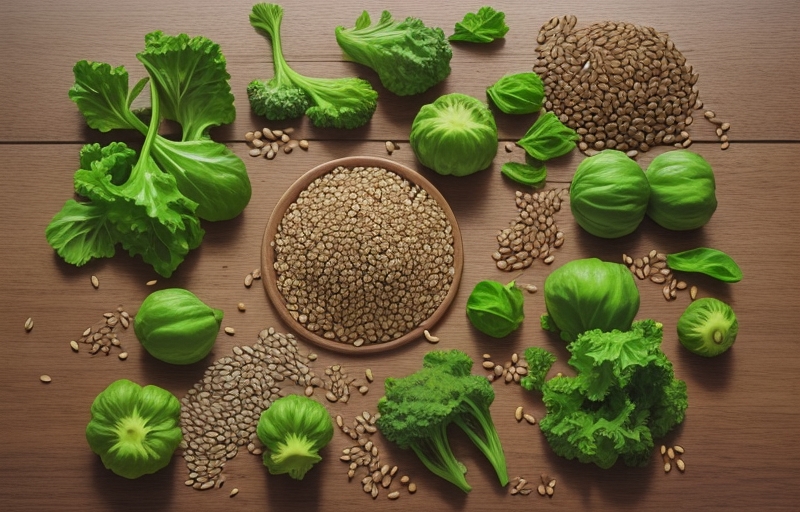Uncover the Essential Vitamins for Canines well being. Explore nutrient-rich foods like carrots and spinach, but be cautious with portion control and potential allergies. Ensure your furry friend’s health with this in-depth guide.
Introduction
Dogs, much like humans, require a balanced and nutritious diet to thrive. Essential vitamins play a crucial role in supporting various bodily functions and maintaining optimal health in canines. From bolstering the immune system to promoting proper growth and development, vitamins are indispensable for our four-legged companions. In this article, we will delve into the world of essential vitamins for dogs, with a particular emphasis on vitamin-rich foods such as carrots and spinach.
List of Foods For Dogs That Have Vitamins

Here’s a list of foods that are rich in various vitamins:
1. Vitamin A:
- Carrots
- Sweet potatoes
- Pumpkin
- Spinach
- Liver (in moderation)
2. B Vitamins:
- B1 (Thiamine): Pork, nuts, seeds
- B2 (Riboflavin): Dairy products, lean meats, green leafy vegetables
- B3 (Niacin): Poultry, fish, peanuts, whole grains
- B6 (Pyridoxine): Bananas, poultry, fish, potatoes
- B12 (Cobalamin): Meat, dairy products, eggs
3. Vitamin C:
- Citrus fruits (oranges, lemons)
- Strawberries
- Bell peppers
- Broccoli
- Kiwi
4. Vitamin D:
- Fatty fish (salmon, mackerel)
- Cod liver oil
- Fortified dairy products
- Sunlight exposure
5. Vitamin E:
- Nuts (almonds, sunflower seeds)
- Seeds (sunflower seeds)
- Vegetable oils (sunflower oil, wheat germ oil)
- Spinach
6. Vitamin K:
- Leafy green vegetables (spinach, kale, broccoli)
- Brussels sprouts
- Green beans
- Asparagus
These foods provide a diverse range of vitamins, and incorporating them into a balanced diet can contribute to overall health and well-being. Remember to consult with a veterinarian before making significant changes to your pet’s diet.
Essential Vitamins for Canines

1. Vitamin A: The Visionary Nutrient
Vitamin A is vital for maintaining your dog’s vision, immune system, and skin health. Carrots are a powerhouse of this essential nutrient. They contain beta-carotene, a precursor to vitamin A, which promotes good eyesight and a healthy coat.
2. B Vitamins: The Energetic Ensemble
B vitamins, including B1 (thiamine), B2 (riboflavin), B3 (niacin), B6 (pyridoxine), and B12 (cobalamin), are crucial for energy metabolism, nerve function, and red blood cell production. Spinach is an excellent source of B vitamins, contributing to your dog’s overall vitality.
3. Vitamin C: The Immune Booster
Vitamin C is an antioxidant that aids in immune system support and collagen formation. While dogs can produce their own vitamin C to some extent, incorporating sources like strawberries and bell peppers can provide an extra boost.
4. Vitamin D: The Sunshine Vitamin
Vitamin D is essential for bone health and calcium absorption. Dogs can obtain vitamin D through exposure to sunlight, but fatty fish like salmon and mackerel also provide this crucial nutrient.
5. Vitamin E: The Antioxidant Guardian
Vitamin E is an antioxidant that protects cells from damage and supports skin health. Nuts, seeds, and sunflower oil are rich sources of vitamin E that can be included in your dog’s diet in moderation.
6. Vitamin K: The Clotting King
Vitamin K is essential for blood clotting and bone health. Leafy green vegetables like spinach are excellent sources of vitamin K, contributing to your dog’s overall well-being.
Things to Keep in Mind Before Using Vitamin-Rich Foods

While incorporating vitamin-rich foods into your dog’s diet can offer numerous health benefits, it’s essential to consider a few key factors:
1. Portion Control:
Just like with any dietary addition, moderation is key. Too much of even the healthiest foods can lead to nutritional imbalances or digestive issues.
2. Allergies and Sensitivities:
Be aware of any allergies or sensitivities your dog may have to certain foods. Introduce new items gradually and observe for any adverse reactions.
3. Veterinary Consultation:
Before making significant changes to your dog’s diet, consult with your veterinarian. They can provide personalized recommendations based on your dog’s breed, age, health status, and specific nutritional needs.
Conclusion:
Ensuring your dog receives the essential vitamins they need is a cornerstone of responsible pet ownership. By incorporating vitamin-rich foods like carrots and spinach into their diet, you contribute to their overall health and well-being. Remember to exercise caution, maintain moderation, and seek professional guidance to provide your furry friend with the best possible nutrition. A healthy and well-nourished dog is a happy companion for life.
Read Also: The Complete Guide to Vitamins for Dogs
Frequently Asked Questions (FAQs)
Q1: Can I feed my dog raw carrots and spinach?
Yes, dogs can safely consume raw carrots and spinach. Ensure they are cut into bite-sized pieces to prevent choking and monitor your dog for any signs of discomfort.
Q2: How often should I include vitamin-rich foods in my dog’s diet?
The frequency of inclusion depends on your dog’s individual needs and overall diet. Consult your veterinarian for tailored advice on incorporating vitamin-rich foods.
Q3: Are there any signs of vitamin overdose in dogs?
Excessive intake of certain vitamins can lead to toxicity. Watch for symptoms such as lethargy, vomiting, or changes in behavior. If you notice any unusual signs, consult your veterinarian promptly.

1 thought on “Essential Vitamins for Canines: A Comprehensive Guide”